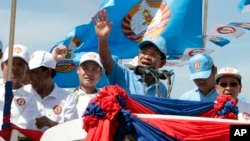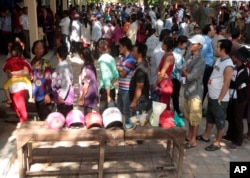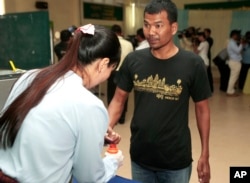Cambodia's ruling political party breathed a sigh of relief as vote counting continued following Sunday's commune elections, which left opposition supporters disappointed after their leaders failed to deliver on electoral expectations.
Buoyed by gains at national elections in 2013, the Cambodian National Rescue Party (CNRP) had expected to win 60 percent of the popular vote at the commune poll, where more than 12,000 local and district positions were contested.
Instead, the CNRP picked-up just 44.22 percent of the vote, according to early government figures, sharply higher than the 30.6 percent it scored at commune elections in 2012 but still significantly short of expectations and of what's required if its leader, Kem Sokha, is to become the next prime minister after national elections next year.
The ruling Cambodian People's Party (CPP) picked-up 51.39 percent of the overall vote.
“I expect they will be happy or at least relieved,” said one CPP source who did not want to be named.
Official results are due June 25.
CNRP disappoints
Absent from this election was the long serving and highly popular opposition leader Sam Rainsy, who stepped aside for his less charismatic deputy, Kem Sokha, after several criminal defamation suits forced him to retire from politics.
Analysts said Sam Rainsy's appeal was missed, especially among younger voters. They said the CNRP had failed to extend its reach beyond the capital and provincial towns and into the CPP's traditional rural heartland where Prime Minister Hun Sen is at his strongest.
The commune electoral system, which is fought on local issues and differs substantially from the national poll, also had an impact.
Commune elections were initiated in 2002 and designed to complete Cambodia's transition from communism to full democracy. At that time, the CPP held all commune positions with a party machine entrenched in even the remotest of villages.
Over successive elections, opposition parties were expected to win positions on councils and as district chiefs who wield constitutional powers in the national senate.
But 15 years and four elections later, the CPP still has control of more than 70 percent of the 1,646 communes, control of the senate, and a modest lead in the popular vote. Minority parties have also made a comeback, picking up four percent of the vote.
“The reason that I supported the CNRP was because I wanted to see change with a leader that has high ethical standards,” said a disappointed Kea Ponlok, a 29-year-old CNRP supporter in Phnom Penh. “I am not really happy with the preliminary result.”
Focus shifts to national poll
Kea Ponlok said the CNRP must improve its strategy in the countryside, where the CPP dominates, while trying its best to cement its hold on the burgeoning youth vote, which backed the opposition at the 2013 national poll.
“I want them to promote more broadly so that youth and people in difficult [to reach] areas who lack political knowledge can fully understand the party’s policies, and that what they are doing is real and clear in the election,” he said.
Others complained a CNRP key election promise to fund each commune directly with $500,000 a year was flimsy, as the $830 million price tag could not be guaranteed because the CPP government controls the purse strings.
Chea Chheng, 27, voted for the CPP in Phnom Penh and said 300,000 more people voted for the ruling party at this commune election than did at the national poll four years ago.
“Based on this data, plus the government’s policy on reform,” he said, particularly in regards to education, “I believe that after the 2018 election the CPP will still be leading the government.”
CPP rules
Since late 2015, Cambodian politics has been marred by Hun Sen's threats of war should his party lose elections and the criminalization of defamation laws that resulted in CNRP supporters being jailed. But election day and the two-week official campaign period were peaceful, winning praise from established democracies like the United States.
It's a pattern that long-term observers are familiar with and will probably persist leading into next July's national election.
“At this year's election, it was much better and more people participated,” Chea Cheng said, adding the peacetime economic accomplishments of the CPP would give it an advantage going into the national election.
Kea Ponlok, however, was also confident the CNRP can improve on its standing and win in 2018.
“My hope is that if the CNRP wins the national election, they must do what they have promised to do and guarantee this party and their leader actually serves the interest of their own people.”
Molyny Pann contributed to this report.













